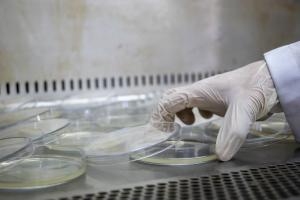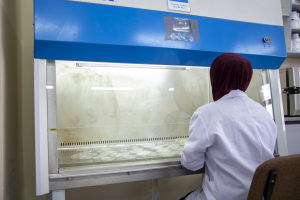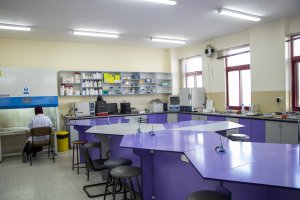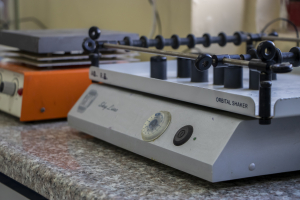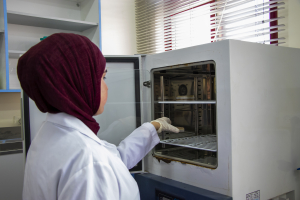General Biology Lab 2, affiliated with the Applied Biology program within the College of Applied Sciences, is equipped to accommodate 15 students and features modern tools and devices essential for imparting a range of practical skills and abilities.
It encompasses various devices, tools, and materials crucial for instructing students in many basic and specialized biology skills, including:
- DNA extraction from animal cells, plants, and bacteria.
- DNA amplification via PCR.
- DNA separation through gel electrophoresis.
- DNA cutting utilizing restriction enzymes.
- Cloning of genes of interest in modified E. coli.
- Molecular diagnostic techniques.
- Safe and effective handling of microbes.
- Bacterial culture methodologies.
- Various bacterial staining techniques.
- Sample testing for the presence of virulent bacteria in food, water, and human samples, employing Community-Based Learning (CBL), an academic form of experiential learning integrating community service with explicit academic objectives and reflective practices.
- Bacterial cultivation in solid media via streaking and spreading methods.
- Cultivation in broth with growth measurement and characterization in solid media.
- Selection of media suitable for cultivating clinical samples such as urine, throat swabs, sputum, CSF, blood, and stool.
- Biochemical tests including catalase, coagulase, oxidase, sugar fermentation, indole, H2S, urease, and citrate.
- Isolation and identification of Staphylococcus and Streptococcus.
- Isolation and identification of Enterobacteriaceae and other Gram-negative bacteria.
- Antibiotic sensitivity testing.
- Proper handling of materials and equipment.
- SDS PAGE technique.
- Identification of various types of parasites and their anatomical components.
The lab caters to students from various programs, primarily focusing on:
- Students majoring in Biology within the College of Applied Sciences.
- Students enrolled in the College of Human Medicine and Health Sciences, including those studying:
- Healthy and Therapeutic Nutrition
- Occupational Therapy.
- Medical Preparations in Cosmetology.
As for its equipment and supplies, the lab is well-equipped with a diverse range of instruments and essentials, including:
- Autoclave
- Incubator
- Incubator shaker
- PCR machine
- Electrophoresis device
- Centrifuge (two types)
- Safety cabinet with UV light
- Distiller
- Low-temperature circulating bath
- Water bath
- Vortex
- pH meter
- Analytical balance
- Hotplate
- Orbital shaker
- Compound light microscopes
- Dissecting microscope
Occupational Health and Safety Instructions:
- Wear lab coats and gloves during specified experiments.
- Refrain from smelling or tasting chemicals.
- Entry into the laboratory is prohibited without supervision.
- Consumption of food or drinks is strictly prohibited within the laboratory premises.
- Do not adjust or handle equipment without the presence of a supervisor.
- After use, ensure tools and materials are returned to their designated locations.
- You must work under a safety cabinet in microbiology experiments
- Ensure your safety by working under a safety cabinet during microbiology experiments.
Laboratory Staff:
Laboratory Course Instructors: Dr. Fawzi Al-Razem, Dr. Sharaf Al-Tardeh, Arwa Mujahed, and several part-time teachers.
Laboratory Supervisors: Heba Al Aloul and Rawand Al-Ajlouni.
Courses covered in the lab:
- مختبر احياء جزيئية
- مختبر تشخيص جزيئي
- مختبر احياء دقيقة , مختبر احياء دقيقة في الغذاء
- مختبر احياء دقيقة طبية
- مختبر احياء 2
- مختبر علم الطفيليات

